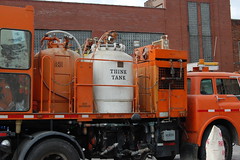 Richard McDermott has a piece on the HBR website that has me thinking. Free Your Staff to Think opens with this description of the shift to self-service in many organizations:
Richard McDermott has a piece on the HBR website that has me thinking. Free Your Staff to Think opens with this description of the shift to self-service in many organizations:
With sophisticated document management systems, global connectivity, and on-line networks professionals can find research reports, best practices, articles and experts from anywhere in the world. Because professionals have such direct access to information and people, many companies have let most of their administrative assistants go, leaving it to professionals to manage their own information. Over the last decade self-service has also replaced much traditional customer service.
Then he goes on to suggest that this idea of self-service for professionals may not be as great as we'd like it to be. Specifically, if it is the professional doing all the finding and production work, when will they have they have the time to actually do the thinking that they are paid to do?
One of the things I have been thinking about knowledge management recently is that KM has help knowledge workers do their work more effectively. With earlier knowledge management, those barriers looked like access to information and people. With those barriers out of the way, new barriers arise - things like the time to acquire and vet materials. Knowledge management approaches are now shifting to deal with this barrier. McDermott's piece suggests three ways to help along these lines:
- Create knowledge intermediaries. I see this as re-invigorating the para-professional, whose responsibility is to support professionals and deal with knowledge and information tasks that are . McDermott mentions companies that are repurposing secretaries as internal information stewards - to the point of adding librarianship skills to their arsenal.
- "Kit" information. I love this suggestion as it jibes very well with my recent work in project management: Make sure people have a kit of what they will need to do a specific task. In this case the kit is the information and resources required to do the work, rather than the manufacturing version of a properly-stocked toolkit. The rule in project management is that you don't start work without "full kit" to complete the work. And it is the responsibility of line management to monitor the use and effectiveness of the kit.
- Establish individual and collaborative think tanks. Give people the space and responsibility to think. Create explicit opportunities for people to engage in double-loop learning. It will pay off.
[Photo: "Think Tank" by mdesive]